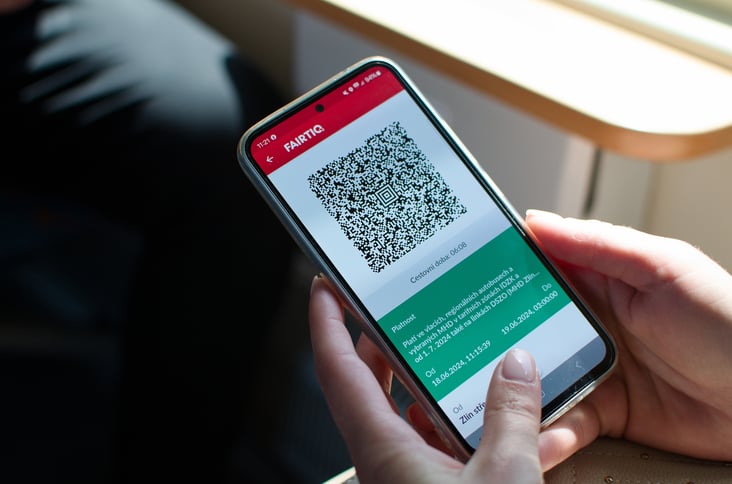
Checking in too late, checking out too early, faked location data and bogus personal details: these are a few of the ticket fraud scenarios that could play out on the FAIRTIQ app. They rarely succeed. During a webinar on 6 April 2022, a panel of experts set out the steps that the Swiss start-up takes to prevent ticket fraud and help public transport companies prosecute fare cheats.
Paula Ruoff, FAIRTIQ Lead in Germany, is frank about the concerns that are frequently brought to the company's attention, "There is a general assumption that it is easier to cheat with the FAIRTIQ app than with a paper ticket because users can quickly activate the app when they see the ticket inspector arrive." The reality could not be more different. From its very early days, FAIRTIQ has always worked hard, and successfully, to combat ticket fraud in the app.
High inspection rate and systematic analysis of user travel behaviour: Kryptonite for potential fraudsters
One person who has known FAIRTIQ for many years and whose input has helped, and continues to help make the app more secure is Daniel Fankhauser, former head of the SBB's counterfeiting and fraud unit. During the webinar, he pointed out that one of the key advantages of the FAIRTIQ app is its 100% inspection rate; in western Europe, this is in the single digits. While conventional ticket inspection processes can only ever provide a snapshot, the FAIRTIQ app records and analyses the user's entire travel behaviour. As a result, it is able to proactively spot suspicious patterns of behaviour.
Fraud scenarios and how to prevent them
Sarah Collard heads the fraud monitoring team at FAIRTIQ. During the webinar, she presented the following fraud scenarios based on real-life cases:
- Insufficient funds: the app automatically checks the solvency of users before each journey and only allows them to check in if they have no outstanding bills on their FAIRTIQ account.
- Faked smartphone data: the app detects when the device's default settings have been changed or location data sharing is blocked.
- Late check-in or early check-out: these functions only work when the user is in a static location close to the stop. The system detects when a user attempts to check in or out either while they are in the moving vehicle or are between stops.
- Showing a screenshot at the point of inspection: the FAIRTIQ ticket shows a countdown clock which allows the ticket inspector to immediately see whether the user is showing an active ticket and whether the check-in time is correct.
AI monitoring coupled with an interdisciplinary fraud management team
Algorithms detect attempts to cheat the system. As Sarah Collard explained that the effectiveness of the monitoring system is determined by two factors: the use of artificial intelligence and the make-up of the support team, "Our fraud management team consists of both permanent employees and students from a range of disciplines. Thanks to the different perspectives they bring to their work, we are able to identify instances of fraud more accurately, improve our algorithms and communicate better with our customers."
FAIRTIQ helps to prevent ticket fraud and secure revenues
Daniel Fankhauser pointed out that fraud management is implemented in close cooperation with the public transport companies. FAIRTIQ notifies the transport providers of instances of fraud. It then falls to the companies to collect the outstanding fares and, if necessary, launch proceedings against the user who committed the fraud. Where required, FAIRTIQ can provide the company with documents that can be used in court if required. Customer communication is also handled by the company's customer service, with internal support from FAIRTIQ.
FAIRTIQ helps to prevent ticket fraud and secure revenues
Paula Ruoff is clear about the benefits for the public transport sector, "More in/out customers means fewer cases of fraud and greater revenue security." For Daniel Fankhauser, "There is no such thing as a fraud-proof system. The potential to cheat is baked in to every ticket." Rather, the question we should be asking is how widespread fraud is in a given system. At the end of the webinar, a clear answer emerged: thanks to the efforts of the FAIRTIQ fraud management team, it is becoming increasingly difficult to cheat the system and get away with it.
FAIRTIQ will continue to do everything in its power to expand and improve its monitoring activities so that its partners and law-abiding passengers benefit, and the cheats lose out.







Share